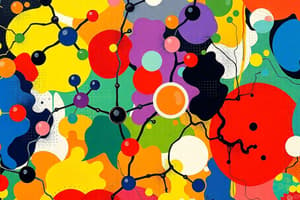Podcast
Questions and Answers
What is biochemistry primarily concerned with?
What is biochemistry primarily concerned with?
The study of the chemicals of living organisms.
Which four elements make up over 99% of the mass in living organisms?
Which four elements make up over 99% of the mass in living organisms?
Hydrogen, carbon, oxygen, and nitrogen.
What groundbreaking event in 1828 changed the understanding of organic compounds?
What groundbreaking event in 1828 changed the understanding of organic compounds?
Wöhler synthesized urea from inorganic materials.
How does carbon contribute to the diversity of life forms?
How does carbon contribute to the diversity of life forms?
What role does biochemistry play in fields like agriculture and medicine?
What role does biochemistry play in fields like agriculture and medicine?
What is the significance of trace elements in living organisms?
What is the significance of trace elements in living organisms?
What was initially believed regarding the production of organic compounds?
What was initially believed regarding the production of organic compounds?
What is an example of a simple organic molecule formed by carbon?
What is an example of a simple organic molecule formed by carbon?
Flashcards are hidden until you start studying
Study Notes
Introduction to Biochemistry
- Biochemistry is the study of the chemicals of living organisms.
- It provides a fundamental understanding of how biological systems work.
- Biochemistry is crucial in various fields like agriculture, medicine, fermentation, and nutrition.
- It forms the basis for advancements like genetic engineering, biotechnology, and 'designer proteins'.
- Biochemistry highlights the similarities among living organisms, unifying biology.
Elements Found in Living Organisms
- 16 elements are essential for life out of approximately 100 in the Earth's crust.
- Hydrogen, carbon, oxygen, and nitrogen are the four most abundant elements, accounting for over 99% of the mass and atomic count in living organisms.
- The elements are grouped into: chief elements, ions, and trace elements.
- Chief elements are found in all organic molecules, and they are ordered by atomic mass in the table.
- Ions are charged atoms, which are also present in all organisms.
- Trace elements are present in small amounts but are still essential for life.
The Importance of Carbon
- Life on Earth is primarily carbon-based.
- All organic molecules contain carbon.
- In 1828, Wöhler synthesized urea (an organic compound) from inorganic materials, disproving the theory of a special "life force" necessary for creating biochemicals.
- Carbon forms strong covalent bonds with other elements, allowing it to create a diverse range of molecules.
- Methane (CH4) is an example, showing carbon's ability to form four covalent bonds.
Studying That Suits You
Use AI to generate personalized quizzes and flashcards to suit your learning preferences.


